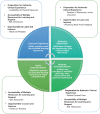A Qualitative Study on the Experiences of Preclinical Students in Learning Clinical and Communication Skills at a Simulation Centre
- PMID: 37886265
- PMCID: PMC10597961
- DOI: 10.1007/s40670-023-01851-7
A Qualitative Study on the Experiences of Preclinical Students in Learning Clinical and Communication Skills at a Simulation Centre
Abstract
Introduction: Simulation centres (SC) and its learning resources are now firmly established as part of medical education. In SC, medical students obtain both knowledge and skills based on a combination of theory and practice using provided resources. This study aims to explore medical students' use of SC learning resources to learn clinical and communication skills based on Kolb's experiential learning cycle. This is based on the research question 'How are the SC resources useful in supporting preclinical medical students' clinical and communication skills learning?' The findings of the study can make a case for further enhancement of SC design and resources for medical students in the preclinical phase.
Methods: A qualitative study involving 20 preclinical medical students with learning experiences in SC was conducted between December 2019 and 2020 at a medical school in Malaysia. Semi-structured interview questions were developed based on Kolb's learning cycle. The data were thematically analysed using the six phases of Braun and Clarke's thematic analysis.
Results: Three main themes were identified based on preclinical medical students' experiences in SC; they were 'preparation for authentic clinical experience', 'accessibility of multiple resources for learning and support' and 'opportunities to learn and improve'.
Conclusions: The SC's resources have a significant and positive role in supporting preclinical medical students learn clinical and communication skills. The SC resources prepared them for authentic clinical experiences with a patient-centred care approach and self-directed learning opportunities. Social support from peers, peer tutors and academics emerged as a key finding and resource of the SC as they help preclinical students learn and improve.
Keywords: Kolb’s experiential learning cycle; Learning resources; Preclinical medical students’ experiences; Simulation centres.
© The Author(s) 2023.
Conflict of interest statement
Conflict of InterestThe authors declare no competing interests.
Figures
Similar articles
-
Final-year veterinary students' perceptions of their communication competencies and a communication skills training program delivered in a primary care setting and based on Kolb's Experiential Learning Theory.J Vet Med Educ. 2014 Winter;41(4):371-83. doi: 10.3138/jvme.1213-162R1. J Vet Med Educ. 2014. PMID: 25148880
-
Student and educator experiences of maternal-child simulation-based learning: a systematic review of qualitative evidence protocol.JBI Database System Rev Implement Rep. 2015 Jan;13(1):14-26. doi: 10.11124/jbisrir-2015-1694. JBI Database System Rev Implement Rep. 2015. PMID: 26447004
-
A Novel Web-Based Experiential Learning Platform for Medical Students (Learning Moment): Qualitative Study.JMIR Med Educ. 2018 Oct 17;4(2):e10657. doi: 10.2196/10657. JMIR Med Educ. 2018. PMID: 30333094 Free PMC article.
-
Interventions for improving medical students' interpersonal communication in medical consultations.Cochrane Database Syst Rev. 2021 Feb 8;2(2):CD012418. doi: 10.1002/14651858.CD012418.pub2. Cochrane Database Syst Rev. 2021. PMID: 33559127 Free PMC article.
-
Does a simulation-based learning programme assist with the development of speech-language pathology students' clinical skills in stuttering management?Int J Lang Commun Disord. 2021 Nov;56(6):1334-1346. doi: 10.1111/1460-6984.12670. Epub 2021 Sep 14. Int J Lang Commun Disord. 2021. PMID: 34519389 Review.
Cited by
-
Global epidemiological trends and burden of cervical and subcervical spinal cord injuries, 1990-2021: a multidimensional analysis using global burden of disease data.J Orthop Surg Res. 2025 Jul 15;20(1):657. doi: 10.1186/s13018-025-05985-9. J Orthop Surg Res. 2025. PMID: 40665368 Free PMC article.
-
Examining Inclusive Language in Clinical Narratives in Medical Biochemistry Textbooks to Model Equitable Patient-Centered Care in Preclinical Undergraduate Medical Education.Med Sci Educ. 2024 Mar 7;34(3):581-587. doi: 10.1007/s40670-024-02015-x. eCollection 2024 Jun. Med Sci Educ. 2024. PMID: 38887417 Free PMC article.
References
-
- Ross K. Practice makes perfect. Planning considerations for medical simulation centers. Health Facilities Manag. 2012;25(11):23–8. https://www.ecri.org/Resources/Medical_Equipment_Planning/Practice_Makes.... - PubMed
-
- Sahu PK, Chattu VK, Rewatkar A, Sakhamuri S. Best practices to impart clinical skills during preclinical years of medical curriculum. J Educ Health Promotion. 2019;8:57. https://www.ncbi.nlm.nih.gov/pmc/articles/PMC6442250/. - PMC - PubMed
-
- Benè KL, Bergus G. When learners become teachers: a review of peer teaching in medical student education. Fam Med. 2014;46(10):783–7. https://www.stfm.org/FamilyMedicine/Vol46Issue10/Bene783. PMID: 25646829. - PubMed
-
- Al-Elq AH. Simulation-based medical teaching and learning. J Family Community Med. 2010;17(1):35–40. 10.4103/1319-1683.68787. PMID: 22022669; PMCID: PMC3195067. https://pubmed.ncbi.nlm.nih.gov/22022669/. - PMC - PubMed
-
- Donovan SK, Herstein JJ, Prober CG, Kolars JC, Gordon JA, Boyers P, Gold J, Davies HD. Expansion of simulation and extended reality for undergraduate health professions education: a call to action. J Interprof Educ Pract. 2021;24:100436. 10.1016/j.xjep.2021.100436. Epub 2021 May 7. PMID: 36567809; PMCID: https://experts.nebraska.edu/en/publications/expansion-of-simulation-and.... - PMC - PubMed
LinkOut - more resources
Full Text Sources


